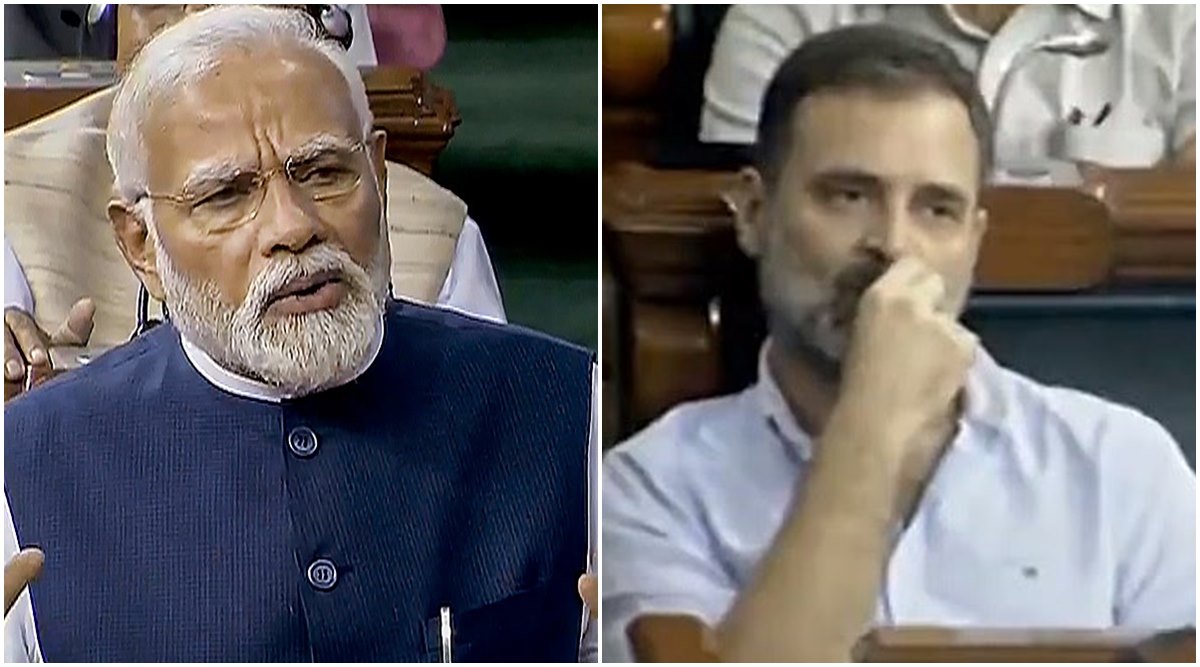“He wears suits worth lakhs…I wear only white t-shirt”: Rahul Gandhi takes jibe at PM Modi

“He wears suits worth lakhs…I wear only white t-shirt”: Rahul Gandhi takes jibe at PM Modi
Rahul Gandhi’s remarks during the rally in Satna, Madhya Pradesh, highlight a political contrast between him and Prime Minister Narendra Modi. By emphasizing his choice of a simple white T-shirt compared to what he describes as the Prime Minister’s expensive suits, Rahul Gandhi aims to draw attention to a perceived difference in their lifestyles and priorities.
The reference to Prime Minister Modi’s earlier assertions about his OBC (Other Backward Classes) background and the subsequent shift in focus could be an attempt to suggest a change in narrative influenced by Rahul Gandhi’s advocacy for caste-based census. Rahul Gandhi implies that Modi’s discourse on caste diminished when he began advocating for a caste-based census, indicating a strategic move in political messaging.
These comments reflect the ongoing political rhetoric and posturing ahead of elections in Madhya Pradesh. Politicians often use such statements to connect with the audience, emphasize relatability, and highlight perceived differences in approach and priorities.
Rahul Gandhi’s announcement about the Congress government’s first step in Madhya Pradesh being the conduct of a caste-based census underscores the party’s commitment to addressing social and demographic issues. The emphasis on conducting a statewide caste-based census in Madhya Pradesh and eventually extending it nationwide aligns with the party’s vision of understanding and addressing the concerns of various communities.
Rahul Gandhi’s rationale for the caste-based census, linking it to the empowerment of the backward class, reflects a perspective that accurate and up-to-date demographic data is essential for targeted policy planning and implementation. The assertion that without a caste-based census, the backward class won’t be able to contribute suggests a belief in the potential of such data to inform policies that address specific community needs.
The anecdote about farmers in Chhattisgarh not knowing the rate of their land serves as an example of the lack of awareness and information among certain sections of the population. Rahul Gandhi’s statement implies that a caste-based census could contribute to better-informed decision-making and resource allocation, empowering individuals and communities with essential knowledge about their socio-economic context.

This announcement is not only a policy proposal but also part of the Congress party’s electoral narrative, presenting a vision for governance and policy priorities if they come to power in Madhya Pradesh. The issue of conducting a caste-based census aligns with broader debates on social justice, representation, and affirmative action in India.
Rahul Gandhi’s statements reflect a critical perspective on the impact of the Goods and Services Tax (GST) and the government’s economic policies, particularly on small businesses. His allegations suggest that the GST, instead of being a fair tax, is viewed as an attack on certain sectors of the economy, specifically targeting farmers, small traders, and businessmen.
The assertion that the government takes GST from poor people and channels the money to big businessmen implies a narrative of economic inequality and favoritism. Rahul Gandhi contends that big industrialists, despite benefiting from government policies, do not contribute significantly to employment generation compared to small and medium-sized businesses. The emphasis on the role of small traders and businesses in providing employment aligns with a broader economic and social justice narrative.
Rahul Gandhi’s reference to demonetization and GST as attacks on small traders and businesses is a common critique voiced by some sections of the opposition. Demonetization, implemented in 2016, involved the sudden withdrawal of high-denomination currency notes from circulation, while the GST, introduced in 2017, aimed to simplify the tax structure but faced criticism for its implementation and impact on businesses.
These statements contribute to the ongoing political discourse around economic policies, taxation, and their effects on different segments of society. By framing GST as a weapon against small traders, Rahul Gandhi is presenting a narrative that resonates with concerns about the challenges faced by smaller enterprises in the face of economic reforms.
Rahul Gandhi’s statements during the rally touch upon multiple themes, including criticism of the Goods and Services Tax (GST), accusations of financial favors to big businessmen, and allegations of a plot to overthrow the Congress government in Madhya Pradesh. Let’s break down the key points:
1. GST as Burden on the Poor:
– Rahul Gandhi argues that the GST is shouldered by OBCs, Adivasis, backward classes, and poor individuals across general categories. The assertion is that the burden of this tax falls disproportionately on these segments of the population.
2. Allegations of Favoring Big Business:
– The accusation is that the government collects GST from the aforementioned groups but directs the funds towards big businessmen, specifically naming Adani and Ambani. This narrative aligns with a broader critique of economic policies, suggesting a perceived alignment of government actions with the interests of powerful industrialists.
3. Political Conspiracy:
– Rahul Gandhi alleges a conspiracy to overthrow the Congress government in Madhya Pradesh, claiming that big industrialists, billionaires, Prime Minister Modi, and Shivraj Singh Chouhan collaborated to undermine the Congress-led administration. The suggestion is that the Congress government was seen as a threat to the interests of powerful business figures.
4. Demand for Equitable Distribution:
– Rahul Gandhi calls for an equitable distribution of funds, stating that whatever money the BJP government has given to Adani should be matched by an equal amount given to the people of the state. This demand is framed as a way to counteract what is perceived as undue influence or favoritism towards big corporations.
5. Control of Modi Government:
– The statement concludes with a claim that Prime Minister Modi’s control is in the hands of Adani, reinforcing the narrative of a close association between political power and big business interests.
These remarks collectively reflect a broader narrative often articulated by the opposition, highlighting concerns about economic policies, perceived favoritism towards influential businessmen, and accusations of political maneuvers to protect certain interests.




